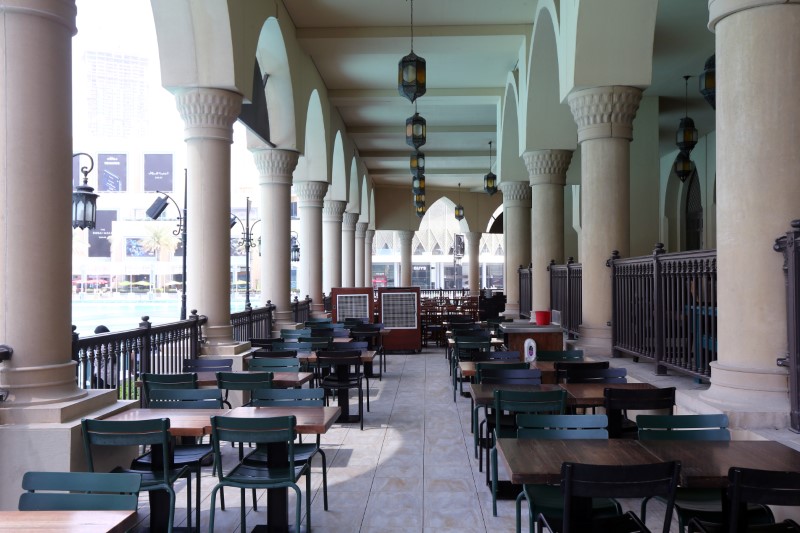By Stephen Kalin and Alexander Cornwell
RIYADH/DUBAI (Reuters) - The United Arab Emirates said on Wednesday it would bar foreign visitors, ban citizens from going abroad and that anyone entering the country must isolate for two weeks, increasing restrictions to curb the spread of coronavirus.
Saudi Arabia reported 67 new infections, bringing its total to 238, and suspended most private sector activities, among various moves by Gulf Arab countries to contain the outbreak.
Kuwait recorded 12 more cases, including six Kuwaitis, an American and a Spaniard who had all been to Britain. That took the total number of infections in the six-nation Gulf Cooperation Council (GCC) to over 1,100.
The UAE, a major international air transit centre and the Gulf region's tourism and business hub, said starting on Thursday all arrivals must remain in home isolation for 14 days or face legal action, state news agency WAM reported, citing Attorney General Hamad al-Shamsi.
The UAE also banned Emiratis from travelling abroad and said it would indefinitely stop issuing visas on arrival from Thursday.
The steering committee of countries participating in Expo 2020, a world fair starting in October that the UAE hopes will boost its economy, met virtually to discuss the impact on preparations and said it would reassess in coming weeks.
Saudi Arabia and Kuwait are on virtual lockdown after temporarily suspending international flights last week and closing most public venues.
Qatar, with 10 new cases taking its total to 452 - the highest in the GCC, has banned entry of foreigners and said 80% of government employees would work from home.
Oman, which registered six more infections to bring its total to 39, has also prevented foreigners from entering and citizens from going abroad. On Wednesday, it suspended public transportation, excluding buses serving remote areas.
The moves are the latest in a series of exceptional measures to combat the outbreak, including cancelling the Umrah pilgrimage in Saudi Arabia and closing mosques, malls and restaurants across the region.
SAUDI SUSPENSIONS
Saudi Arabia, the largest Arab economy, suspended work in most of the private sector for 15 days and directed businesses to implement work-from-home policies.
It said businesses should close main offices, reduce staff levels at secondary locations, limit employees' contact and monitor them for symptoms of infection.
It outlined exceptions for companies providing vital food and health services or utility services for government agencies. Pregnant women, workers over 55 and those with severe pre-existing conditions must be given 14 days additional leave.
An artificial intelligence summit was postponed to September from March, while the authorities instructed banks to restrict the number of customers served simultaneously, ensure safe distance between them, check their temperatures and provide sanitizers.
Riyadh municipal officials distributed sanitizer to drivers, while police in several Saudi cities patrolled the streets, asking people to leave parks and public spaces, local media reported.
"Young people, you are banned from being in public rest areas!" police in northern Tabuk province called through loudspeakers, videos posted on social media showed.
Earlier this week, the government suspended work for most public sector employees and the central bank implemented work-from-home measures for banks. The Cabinet halted regular meetings.
Crown Prince Mohammed bin Salman spoke on Wednesday with German Chancellor Angela Merkel about combating the outbreak and an extraordinary virtual meeting of leaders from the Group of 20 major economies which Saudi Arabia is organising next week.
Oman's central bank became the latest to offer a stimulus package to shield the region's hydrocarbon-dependent economies, saying it would provide 8 billion rials ($20.8 billion) in extra liquidity to banks.
BAHRAIN EVACUATES CITIZENS
Many coronavirus cases in the region are linked to travel to Iran, where the death toll has hit 1,135 and the number of infections 17,361.
Bahrain, which this week recorded the GCC's first death from the disease, will evacuate more citizens from the Iranian city of Mashhad with a second repatriation flight scheduled for Thursday, a Bahraini official told Reuters.
He said the flight, using an Omani aircraft, had been delayed for a week while quarantine facilities were prepared in Bahrain, where a main isolation centre has been set up on a barren island linked to the capital by a causeway.
Gulf airlines have suspended dozens of routes as contagion disrupts global travel. The UAE still allows entry of foreign diplomats, and residents and foreign visitors can enter Bahrain. Qatar and Oman are permitting transit flights.

Qatar Airways laid off about 200 Filipino staff in Qatar this week, Philippines Labour Secretary Silvestre Bello told Reuters. Dubai-based Emirates said it has asked pilots to take unpaid leave.